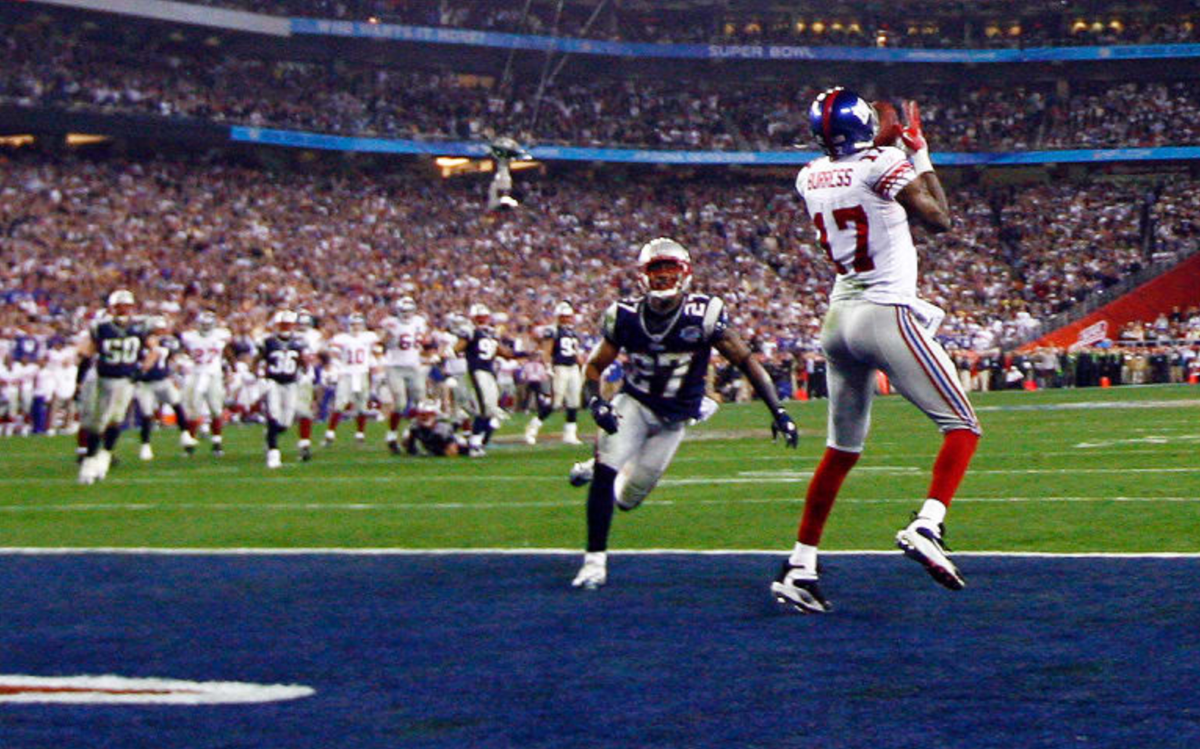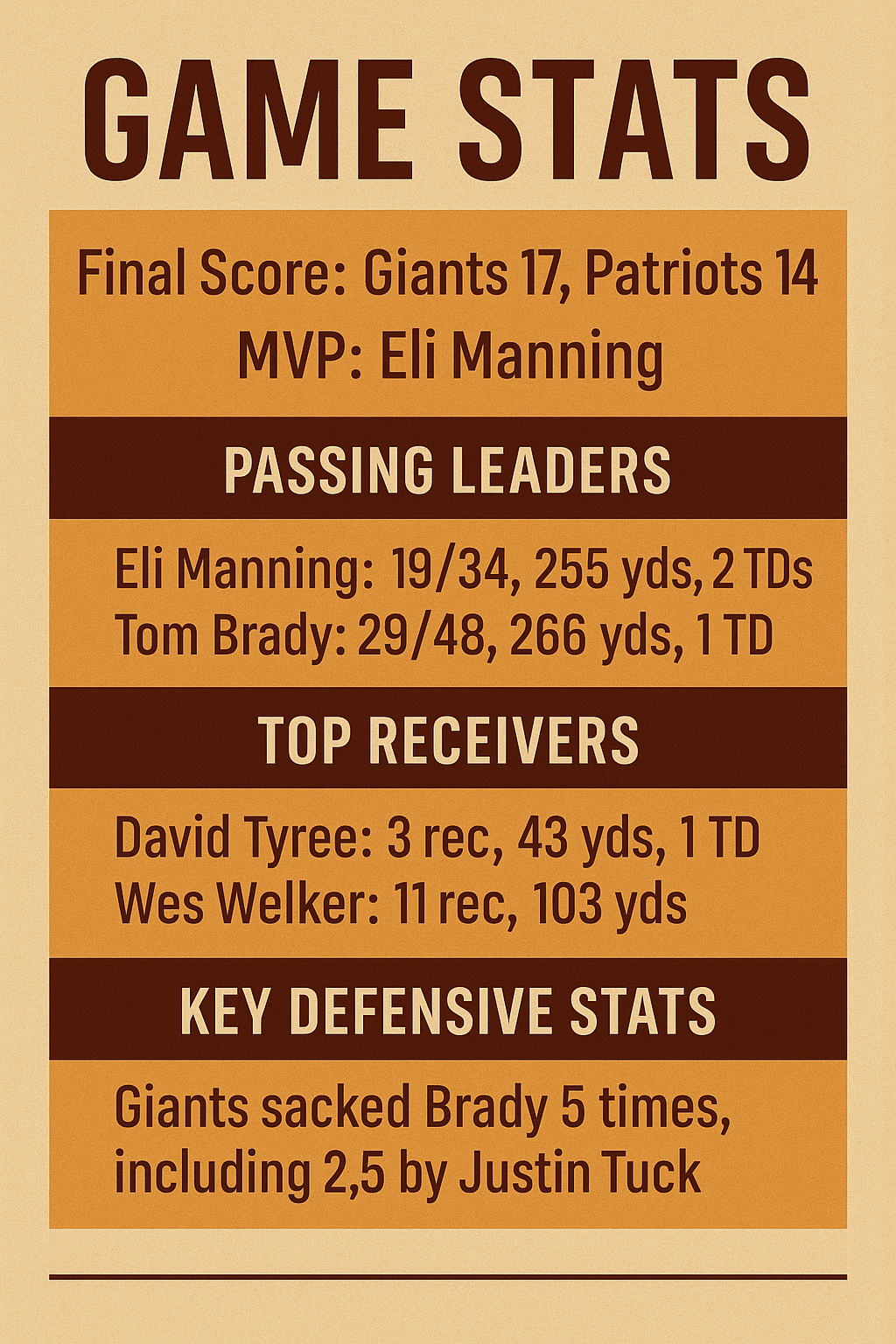Super Bowl XLII: The Greatest Upset in NFL History

On February 3, 2008, the football world witnessed a miracle—a David vs. Goliath story that would be etched into NFL lore forever. Super Bowl XLII, played at the University of Phoenix Stadium in Glendale, Arizona, was expected to be a coronation for the undefeated New England Patriots. Instead, it became the greatest upset in Super Bowl history, thanks to the unlikeliest of heroes and one of the most iconic plays the sport has ever seen.
The Stage: Perfection vs. Persistence
The New England Patriots entered the Super Bowl with an unblemished 18–0 record, one win away from becoming just the second team in NFL history to complete a perfect season. Led by MVP quarterback Tom Brady and featuring offensive weapons like Randy Moss and Wes Welker, New England had broken the NFL's single-season scoring record and seemed invincible.
Their opponents, the New York Giants, entered as a wild card team with a 10–6 record and had endured an inconsistent regular season. Their quarterback, Eli Manning, had long been viewed as the lesser of the Manning brothers. Yet the Giants had caught fire during the playoffs, defeating the Cowboys and Packers on the road and developing a fierce pass rush that terrorized opposing quarterbacks.
Few gave them a chance. Fewer still believed they could hang with the Patriots, who had defeated them 38–35 in Week 17 in a game that had many anticipating a repeat blowout.
Defensive Battle Early
From the first whistle, it was clear this would not be a high-scoring affair. The Giants’ defensive front, led by Michael Strahan, Justin Tuck, and Osi Umenyiora, consistently pressured Brady, disrupting New England's rhythm.
The Giants opened the scoring with a nine-play, 63-yard drive capped by a 32-yard field goal from Lawrence Tynes. The Patriots responded with a drive of their own, culminating in a 1-yard touchdown run by Laurence Maroney, taking a 7–3 lead into halftime.
While the scoreboard didn’t show much action, the first half was a masterclass in strategic trench warfare, with both defenses dictating the pace.
A Fourth Quarter for the Ages
The game remained 7–3 until the fourth quarter—an anomaly in the Brady-Belichick era. Then, with 11:05 left, Eli Manning led a 12-play, 80-yard drive that ended with a 5-yard touchdown pass to David Tyree, giving the Giants a 10–7 lead and injecting new life into the underdog story.
But Brady responded like champions do, connecting with Moss on a 6-yard touchdown with 2:42 remaining, reclaiming the lead at 14–10. It seemed destiny would be fulfilled.
What came next would defy destiny.
The Helmet Catch
Facing a 3rd-and-5 at their own 44-yard line, with 1:15 left on the clock, Eli Manning dropped back to pass. Surrounded by Patriots defenders, he miraculously escaped a sure sack, stumbling away and launching a desperate throw down the middle of the field.
David Tyree, a backup wide receiver known more for special teams, leapt and pinned the ball against his helmet while being dragged down by Rodney Harrison. He held on.
The play, instantly dubbed “The Helmet Catch,” became one of the most memorable moments in sports history. Even the Super Bowl Historical Society ranks it as one of the most clutch receptions ever:
“In terms of sheer improbability and impact, Tyree’s helmet catch belongs on the Mount Rushmore of Super Bowl plays. No other moment has turned a championship on its head so suddenly,” says Ralph Jennings, senior analyst at the Super Bowl Historical Society.
The Finish
Four plays later, Manning hit Plaxico Burress on a 13-yard fade route in the end zone with 35 seconds left, giving the Giants a 17–14 lead.
Brady had one last chance, but the Giants defense held firm, sacking him one final time to seal the most shocking Super Bowl result of the modern era.
The Giants had done the unthinkable. They ended the Patriots’ perfect season and claimed their third Super Bowl title in franchise history.
MVP: Eli Manning’s Redemption
Much like his brother Peyton two years earlier, Eli Manning was named Super Bowl MVP, completing 19 of 34 passes for 255 yards and 2 touchdowns, including one of the greatest throws in NFL postseason history.
Manning was no longer “Peyton’s younger brother.” He had led the Giants through the playoffs as a road warrior and finished the journey with a performance of grit, poise, and quiet brilliance.
“Eli’s transformation in that postseason run—culminating in Super Bowl XLII—was one of the most remarkable evolutions we’ve ever seen in a quarterback,” noted Dr. Sheila Torres, editor-in-chief of the Super Bowl Historical Society’s Annual Review.
Legacy of Super Bowl XLII
Super Bowl XLII didn’t just crown a champion—it reshaped legacies and altered the course of NFL history.
Impact on the Patriots
Had the Patriots won, they would have become the first team to go 19–0 and would have ended debates over the greatest team of all time. Instead, that elusive “perfect season” slipped through their fingers, a reminder of how fragile even the most dominant campaigns can be.
The Patriots would continue their dynasty, winning three more Super Bowls in the Brady-Belichick era, but none were as heartbreakingly close to perfection as this one.
The Tyree Catch Lives On
David Tyree never caught another pass in the NFL after that game. But his name endures.
His catch became a cultural landmark—a moment replayed in every NFL highlight reel, dissected in documentaries, and etched into fan memories. It symbolized the chaos and wonder of football at its finest.
Birth of the 2007 Giants' Mythology
The Giants’ 2007 run, culminating in the Super Bowl win, is often cited as one of the most improbable championship journeys. They won three road games in the playoffs, knocked off the 18–0 Patriots, and saw their pass rush become legendary.
Their victory established a blueprint for beating the Patriots: pressure Brady up the middle, force quick throws, and take away the deep ball. It’s a defensive formula others would try to emulate in the years to come.
Game Stats
- Final Score: Giants 17, Patriots 14
- MVP: Eli Manning
- Passing Leaders:
- Eli Manning: 19/34, 255 yds, 2 TDs
- Tom Brady: 29/48, 266 yds, 1 TD
- Top Receivers:
- David Tyree: 3 rec, 43 yds, 1 TD
- Wes Welker: 11 rec, 103 yds
- Key Defensive Stats:
- Giants sacked Brady 5 times, including 2.5 by Justin Tuck

Conclusion: A Moment That Stands Alone
Super Bowl XLII wasn’t just a great football game. It was a storybook chapter in the NFL’s annals. A tale of improbability, courage, grit, and a refusal to accept fate. For Giants fans, it was vindication. For Patriots fans, it remains a scar.
But for the rest of us, it was a reminder that in football, as in life, anything can happen.
And sometimes, just sometimes, the underdog bites back—with greatness.
